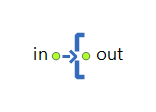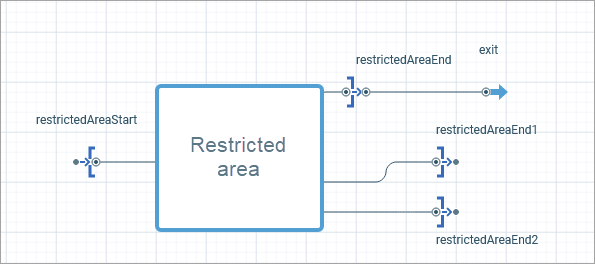
The RestrictedAreaStart block marks the entry to the section (area) of the process where you wish to limit the maximum number of agents. Such an area can have only one entry and any number of exits, each of which must be marked with a block that references this RestrictedAreaStart (see the figure below). Once the number of times RestrictedAreaStart has been entered minus the number of times RestrictedAreaEnd has been exited reaches the limit, the RestrictedAreaStart block blocks the entry and would not allow a new agent to enter until one of the agents exits the area.

The RestrictedAreaStart block is implemented using the Hold block, so the agent is simply passed on to the next block and does not spend any time in RestrictedAreaStart.
If you occasionally allow agents to leave the area other than through a RestrictedAreaEnd block (for example, by programmatically removing them from the flow), the RestrictedAreaStart would not notice this and would count those agents as still in the area, which could result in the area entry being blocked forever.
- Capacity (max allowed)
-
The maximum number of agents allowed in the restricted area.
Syntax: int capacity
Set new value at runtime: set_capacity(new value)
Default value: 10
- On enter
-
Code executed when the agent enters the block.
Local variable: agent — the agent.
| Function | Description |
|---|---|
| int entitiesInside() | Returns the number of agents currently in the restricted area. |
| boolean isBlocked() | Returns true if the entry to the area is blocked, otherwise false. |
- Hold block
- The embedded block that used to block the entry to the restricted area depending on the number of agents there.
- in
- The input port.
- out
- The output port.
-
How can we improve this article?
-


